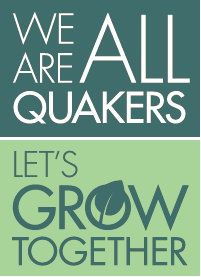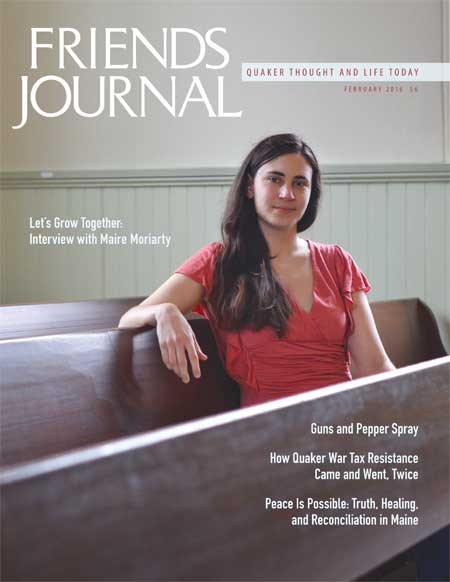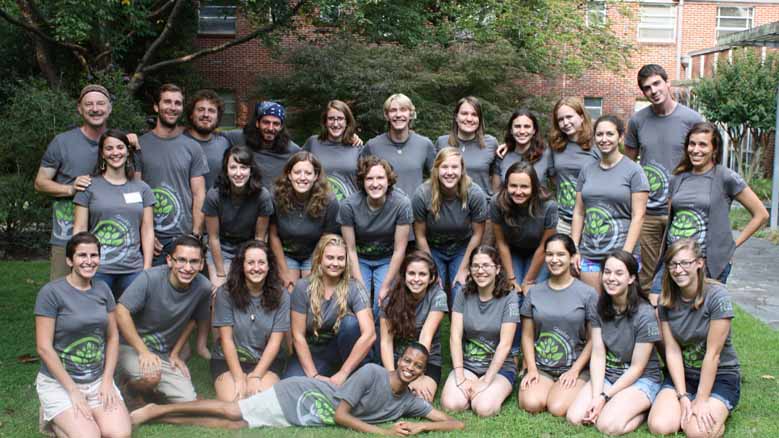
 Maire Moriarty is a member of Germantown Meeting in Philadelphia, Pa., currently living in Wilmington, Del., and worshiping at Wilmington Meeting. A 2013 graduate of Ursinus College, she was a Quaker Voluntary Service (QVS) fellow during the 2013–2014 year of the program, serving in Philadelphia with Friends General Conference (FGC). During that year, she became a member at Germantown Meeting, finding herself at home there. Maire recently started working as a software instructor for the software company Blackbaud, creator of the popular fundraising database Raiser’s Edge. She left the nonprofit industry for this new job, in hopes of making a larger impact in the world.
Maire Moriarty is a member of Germantown Meeting in Philadelphia, Pa., currently living in Wilmington, Del., and worshiping at Wilmington Meeting. A 2013 graduate of Ursinus College, she was a Quaker Voluntary Service (QVS) fellow during the 2013–2014 year of the program, serving in Philadelphia with Friends General Conference (FGC). During that year, she became a member at Germantown Meeting, finding herself at home there. Maire recently started working as a software instructor for the software company Blackbaud, creator of the popular fundraising database Raiser’s Edge. She left the nonprofit industry for this new job, in hopes of making a larger impact in the world.
What were your early experiences of faith, and what brought you to Quakerism?
I was raised by an atheist and an agnostic. The atheist, my dad, had been raised Catholic. The agnostic, my mom, had been raised Quaker. It was clear to me that we were an atheist family. That worked out fine for me.
There’s another piece here too. I was diagnosed with depression in high school, and it was really hard for me to find something to provide a background sense of significance, meaning, or purpose. The core of my depression is that I don’t have that intrinsic sense of a drive. Going to Quakerism was trying to find something extrinsic.
At that point, I really did need community. I didn’t logically think that this was what I needed, but I did start to feel a yearning. I knew about Quakers because of my mom and my grandparents. I had always heard a glossed-over version: they were the abolitionists; they were part of the Underground Railroad, and all of those awesome things about Quakers. What attracted me to the Quakers was their history of pursuing peace in the name of faith. Then I got a better view from an insider’s perspective of what the community really is, which is a group of people that are together for a lot of different reasons. Getting to feel those different nuances, I felt more at home.
Mostly I was attending Upper Providence Meeting in Collegeville, Pa., down the street from Ursinus. Then, when I did Lutheran Volunteer Corps (LVC) in Wilmington, I attended Wilmington Meeting. I started thinking about doing a second year of LVC, and then I realized that I wanted to double down on this Quaker thing. That led me to doing QVS, and I went from seeing the nuances of the community and the members in all of their beautiful joy to being struck head-on with the work that is left to be done. I had the chance to see that there is a lot of imperfection here; there is a lot of work that has to be done, but we are beautiful in our brokenness. People are broken. No person is going to be perfect, and therefore no community is going to be perfect.
Where are you currently worshiping?
I’ve been attending Wilmington Meeting, but I haven’t been attending recently because I’ve been exhausted. I think that is something that has to do with not being raised in a faith tradition. It takes effort to go out and make that entrance to meeting, because it’s not a force of habit that I have built up. Meeting was for the Sundays when I didn’t have something going on. It’s an issue that I think many millennials have: to be regular attenders anywhere because often our lives involve our being away. We tend to be more transient on the weekends.
I still am a member at Germantown, and I’ve been able to get back there a couple times. That’s been really nice and rejuvenating. I was just there recently, during a really important time because I was transitioning from working at a nonprofit to working at the software company. It was wonderful to be able to take that moment and check in at Germantown, and to feel that it was home and family.
What is your experience of meeting for worship? What do you find in the silence?
I remember my first meeting as an adult and trying to figure out what to do. All I really knew was what my mother told me about being raised Quaker by my grandparents. So I was sitting there and wondering what Quakers do now. There’s this Inner Light that I know about, and they believe in peace and justice and being called to minister. So I wondered what was I supposed to do when no one had ministered and I had nothing to reflect upon. That was a very interesting process, when I was starting out so open-ended. I had the opportunity to practice my own process.
If I’m ever struggling to center down, I start visualizing the Inner Light and thinking about what that means; how does it connect all of us? There’s also practicing grace when hearing what people feel led to say and appreciating the genius and cloudedness in everyone’s perception of the world. I hear what they have to say; I seek the genius, give grace to the cloudedness, and also appreciate it is my perception of what I just heard.
I would like to attend a Quaker worship with a minister. I never have, and I think it would be an interesting experience. I have attended plenty of other Christian services, and I have attended Friday salat with a Muslim community. I would say that salat is the closest to that opportunity I have had because there is a message, a ritual, and opportunity for folks to follow the imam, but there’s also an openness for each person to do what he thinks is right when it comes to worshiping in the group. It involves that same internal work of appreciating the light that is around us.
How did the QVS program affect your experience of Quakerism?
It was interesting, especially because it intentionally included the different flavors that exist within Quakerism. Having that shape the experience was really powerful for me. It wasn’t just that we are a Quaker program trying to live out the testimonies in the real world. It was also an inward-facing opportunity to push against our preconceived notions of what Quakerism should mean. I had very little understanding of anything that wasn’t Liberal and unprogrammed Quaker worship. There were things I was pushed to appreciate, that made me uncomfortable. Especially when it came to centering down more with the biblical foundation of Quakerism. There was a closer tie to the Christian aspect of Quakerism, or what used to be Quakerism. It pushed me to be uncomfortable and to grow. It wasn’t just cupcakes and rainbows. No experience that is powerful is just cupcakes and rainbows.
What was the work that you did during your QVS year for FGC?
My work was to support Vanessa Julye, who is the coordinator for FGC’s Ministry on Racism and Youth Ministries programs. I only worked with her on the Ministry on Racism: supporting Quakers who are people of color, and supporting Quakers that are doing anti-racism work and education within Quakerism. We provide opportunities for Friends of color and their families to gather and be Quakers of color together without having to be the only African American, Latino, Asian, etc. Quaker in the room, which is so often the experience.
One of the bigger projects that I worked on was to bring the White Privilege Conference (WPC) to Philadelphia in 2016. The conference is designed for anyone at any level of anti-racism work. It is also unique in having caucuses every day, where various groups can gather based on their identities to meet and discuss how the day is going.
FGC decided that it wanted to invite the WPC to come to Philadelphia in 2016, so the work from there was much more focused on making the conference become a reality. That involved encountering potential partners and putting together a host team of different organizations that will work together on-the-ground to make the conference work in Philly. We were also mindful of pursuing organizations to partner that would represent the beautiful diversity in our area. I am still part of the host committee and represent Philadelphia Yearly Meeting. That’s actually been my strong connection to Quakerism for this past year.
What keeps you coming back to Quakerism?
I was brought up lacking a faith tradition, so the openness of Quakerism to having different kinds of theology is important. I acknowledge that there are really amazing things that happen—especially when you bring people together in community—that I can’t explain, and that’s kind of my theology. I have the familial side as well as the feeling that this is the only place where I can grow as a member of a community. I’m not going to go to the community and say, “Accept me as I am, completely as I am, and don’t ever try to help me grow.” I am here to grow with you. Another reason I keep coming back is that it is hard to find community nowadays, and it’s really powerful to have one that I can be with. Maybe right now, what I am seeking is different from what brought me to it, but in the end it’s an extended family structure, and that’s hard to find.




Comments on Friendsjournal.org may be used in the Forum of the print magazine and may be edited for length and clarity.